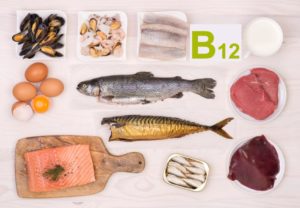Feeling exhausted or sluggish? Or do you have trouble remembering your daily chores? Well, these could be telltale signs of you missing something – may be Vitamin B12. Vitamin B12 is an important nutrient that aids the production of red blood cells in your body. It also promotes the functions of nervous system and synthesis of your DNA or genetic code.
It’s no wonder that B12 is a miracle vitamin since it plays a principal role in important functions of your body. From boosting metabolism, strengthening the immune system to cognitive function, the perks of Vitamin B12 are plenty.
Vitamin B12 is vital for health
Many people receive Vitamin B12 shots or injections in order to boost their energy levels. While it is true that Vitamin B12 supports healthy energy levels, it does more than that Here are the top functions of Vitamin B12 and why you need it in good amount:
- Keep you Heart-Healthy – One of the major roles of Vitamin B12 is to remove homocysteine from the blood. Homocysteine tends to damage your arteries resulting in inflammation or heart disease.
- Prevent Nerve Damage – This vitamin helps to keep the protective covering of the nerves intact.
- Look and feel good – You will not feel too down physically or mentally if you maintain the right levels of Vitamin B12 in your body. Studies have shown that those who get enough B12 have more positive outlook. Also, B12 supports DNA health, thereby keeping your cells younger.
- Protect your Brain – Cobalamin or Vitamin B12 deficiency can lead to dementia or even Alzheimer’s as it can deteriorate the protective covering called as myelin sheaths of the brain’s nerves and its signaling capabilities.
Symptoms and Signs of Vitamin B12 Deficiency
This vitamin is water-soluble or in other words, your body can absorb only a small amount while the rest gets excreted in urine. Now, that is why Vitamin B12 deficiency is common and often difficult to identify. Initial signs can range from fatigue, weakness, brain fog and advanced tip-offs can be accounted to numbness or tingling in limbs, depression or even paranoia.
- Anemia – The prime clinical manifestation of Vitamin B12 deficiency is megaloblastic anemia that is a type of anemia which leads to fatigue, increased heart rate, and dizziness
- Peripheral Neuropathy – This is a nerve impairment that damages the formation of the protective covering of the nerves resulting in prickling sensation like tingling, numbness, and weakness in your feet or hands
- Tongue Swelling and Mouth Ulcers – Glossitis or the condition of unusually painful or smooth tongue can occur from this deficiency
- Dementia, Stroke, and Alzheimer – Vitamin B12 deficiency can increase the risk of these ailments due to excess harmful homocysteine levels
- Blurred or Disturbed Vision – This happens when untreated B12 deficiency results in damage to the optic nerve present in the eyes
- Mobility Impairment – It can make you prone to falling with loss of balance and coordination. This symptom is often seen amongst the elderly
- Jaudinced or Yellow Skin – Your skin may seem to appear with a slight yellow tinge since it hampers the growth of red blood cells in your body and increases the rate of bilirubin
- High Temperature – Certain patients seem to experience a spurt in their body temperature. However, this is a very rare symptom
Vegetarians and Vegans at Risk
This vitamin is not like every other vitamin. It can be found mostly only in animal products like eggs, meat, shellfish, and dairy. Up to 15% of people do not receive enough B12 and they are most likely to be Vegetarians. However, you can choose to include dairy products, vitamin B12 fortified foods like breakfast cereals and grains or opt for supplements. Talk to your healthcare provider of how you can maintain B12 levels in your body.
Top 10 Food Sources of Vitamin B12
Vitamin B12 is an essential nutrient that you definitely don’t want to miss in your diet. Here are the top picks of some vegan and other foods high in B12:
- Cottage Cheese, Swiss Cheese
- Fortified Cereal
- Milk and Yoghurt
- Nutritional Yeast
- Tuna, Shrimp, Sardines
- Beef and Red Meat
- Eggs
- Chicken
The Take Home
The good news is that if you suffer from Vitamin B12 deficiency, its effects can be easily reversed especially at early stages. If you feel you are at risk or have any of the symptoms consult with a doctor. Load up on natural sources of Vitamin B12 in your diet and stay healthy physically and mentally!
Read about Vitamin D, a Prohormone.
Omega-3 Fatty Acids are Vital for Health: Benefits and Food Sources

